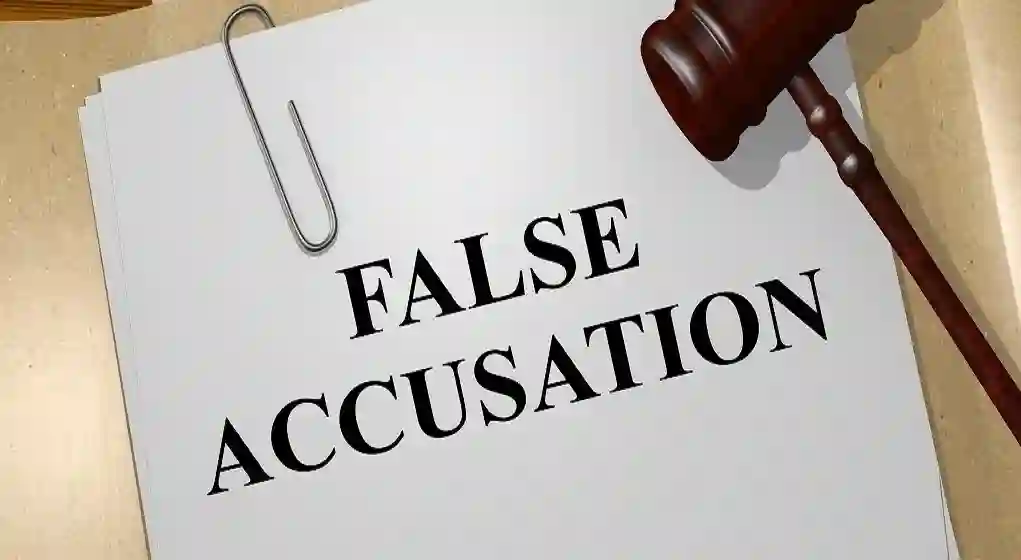What to Do If You’re Falsely Accused of a Crime

Alright, so here you are—falsely accused of a crime. What a nightmare. No one sees it coming, and suddenly, your entire life is turned upside down. The phone rings, someone’s knocking at your door, and BAM—you’re in a situation that feels like a bad TV show. I get it. But don’t panic yet. I’m going to break it all down for you—step by step—on how to handle being falsely accused, and I’m gonna keep it real.
So, What Exactly Is a False Accusation?
Okay, let’s set the scene. You’ve been accused of something you didn’t do. Maybe you’re accused of theft, assault, or some other crime you know in your gut you didn’t commit. In fact, if someone was gonna be guilty of something, it’d be that guy who cut in line at Starbucks earlier today. But here you are, wrongfully caught up in all this drama.
False accusations can come from all kinds of places: misidentification, misunderstandings, or even someone trying to ruin your life for their own reasons. But no matter how you ended up here, it’s critical to understand what a false accusation really means—and how it can mess up your day. Fast.
Types of False Accusations:
- Criminal: Think you’re accused of robbery or worse—things that could put you behind bars.
- Civil: Like defamation. Someone says something that damages your name (don’t let ’em get away with that).
- Family Law: Divorce or custody drama where your ex says you did something terrible (they didn’t, but it’s a mess).
Once you know what you’re up against, you can start strategizing to protect yourself.
Step 1: Chill, and Start Collecting Info
Look, I know it’s easier said than done, but the first thing you gotta do is not freak out. Seriously. Panicking won’t help. Take a deep breath (or, heck, take a walk around the block), and gather as much info as you can.
If you don’t keep your cool, you’ll get caught up in the whirlwind of emotions that comes with being falsely accused.
Here’s what you need to do right off the bat:
- Listen. I mean, really listen to the details of the accusation. You’ll need every scrap of info for your defense.
- Write everything down. Trust me on this. Document everything. And I mean EVERYTHING. Conversations, events, dates. It’s all important.
- Don’t engage. Avoid getting into a fight with the person accusing you, no matter how tempted you are. Don’t give them anything to use against you.
And hey, I get it. You’re probably dying to shout, “I didn’t do it!” from the rooftops, but just hold on. You’ll have your day to defend yourself, but first, you’ve gotta get all the facts.
Step 2: Get Yourself a Lawyer. Like, Yesterday
Look, if you’ve been falsely accused, you need a professional in your corner. It’s like trying to climb a mountain without a guide—you could do it, but why risk it?
This is not the time to DIY your defense. A skilled lawyer will be able to break down the law, guide you through the process, and make sure your rights aren’t trampled. I learned the hard way: the first time I didn’t hire a lawyer for something serious? I ended up watching reruns of “Judge Judy” in a panic instead of handling it properly. Big mistake.
Why? Because a lawyer can:
- Explain legal jargon: Ever read legal documents? They’re like reading a menu in a language you don’t understand. Your lawyer can translate.
- Protect your rights: They’ll make sure you don’t accidentally say something that’ll come back to bite you.
- Build a defense strategy: They know the best approach to take to prove you’re not guilty.
Trust me—unless you want to play legal roulette, hiring a lawyer is the way to go.
Step 3: Get Evidence—Like a Detective
Here’s the deal: evidence is your best friend when you’re falsely accused. The more you’ve got, the stronger your defense.
What kind of evidence are we talking about?
- Alibi. If you were elsewhere at the time of the alleged crime, find anyone who can back up your story. Even the guy at the taco truck on 5th Ave can save your butt (if you remember the time you were there).
- Texts/Emails. Got a conversation that proves you weren’t involved? Save it. My first trial defense strategy was built on a 5-year-old email from my mom about a birthday party. Weird, right? But it worked.
- Witnesses. If you have people who can back you up, get them on the record. Make them write statements if they’re too shy to testify.
- Physical Evidence. Fingerprints, DNA—anything that says “I wasn’t there.”
The more you gather, the better your odds of proving you’re not guilty of whatever you’re being falsely accused of.
Step 4: Keep It on the Down Low
I know you want to shout to the heavens that you didn’t do it. But you’ve gotta keep it quiet for now. There’s a good chance you’ll be tempted to post about it on social media, or talk to the press. Don’t. Just don’t.
Social media can be a nightmare when you’re falsely accused. One wrong post and someone can twist your words. Plus, every post is like a window into your life that people can use against you. Trust me, I learned this the hard way too. A throwaway tweet about how I “never steal anything except hearts” got way more attention than it should have. Big mistake.
Here’s the move:
- Limit social media. Seriously. It’s better to stay quiet until your lawyer gives you the go-ahead.
- Don’t talk to the press. They’ll be looking for a soundbite, and you’re better off staying mum until your lawyer is present.
- Avoid public confrontations. Don’t go toe-to-toe with your accuser or anyone involved. Your lawyer will handle it, and you don’t need the extra drama.
You’re better off keeping things low-key while your lawyer works the magic behind the scenes.
Step 5: Get Ready for a Trial—Brace Yourself
Fast forward past three failed attempts at keeping your cool, and here you are—trial time. It could happen. If the false accusation doesn’t get thrown out, you’ll have to prepare for the possibility of a courtroom showdown. It’s like “Law & Order,” but with way more stress and less commercial breaks.
Here’s what to do:
- Prepare, prepare, prepare. Review every piece of evidence you’ve gathered. Make sure nothing slips through the cracks.
- Get your witnesses ready. You need them sharp and ready to go. I once saw a key witness forget what day it was—took some serious coaching to get him back on track.
- Testify if needed. Your lawyer will help you decide if you should testify in your defense. In some cases, keeping your mouth shut is the best move.
If you’re falsely accused, a trial is the worst-case scenario. But if you’re ready, you can face it head-on.
Step 6: Consider a Defamation Lawsuit (If It Gets Ugly)
If the false accusations have seriously messed with your reputation, you might want to look into a defamation lawsuit. Think of it as a way to hit back without going to jail.
Defamation can look like:
- False statements that harm your reputation.
- Damage to your career or relationships.
- Actual malicious intent on the part of the accuser.
The goal? Hold the person who falsely accused you accountable and maybe even get some compensation for your troubles.
Step 7: Don’t Forget About Your Mental Health
If you’re falsely accused of something, it’s going to mess with your head. It’s okay to admit that. It’s stressful, it’s draining, and it might make you question every part of your life. Trust me, I’ve been there. I spent weeks ruminating over every single thing I might’ve done to get in that mess. Spoiler: nothing.
What to do:
- Talk to a therapist. If things feel like they’re spiraling, talking to a pro can help. My first attempt at therapy was a disaster (the therapist kept asking me about my mom—that’s a whole other story).
- Lean on friends and family. Call up that friend who always knows how to cheer you up. Even just a quick chat can bring a bit of peace.
- Self-care is a must. Don’t forget to eat, sleep, and take care of yourself. You’ve got enough on your plate.
It’s hard, but your mental health needs to be a priority.
Step 8: Legal Action (If It Gets Worse)
If things are still bad despite everything you’ve done, legal action might be the next step. Don’t shy away from pursuing a dismissal or even taking the accuser to court.
When to act:
- If you’ve got solid evidence. Prove your innocence. Get that case dismissed if possible.
- If your accuser is digging in their heels. Sometimes, people don’t know when to stop. Time to bring out the big guns.
- If your reputation is taking a massive hit. You’ve got a right to defend yourself.
A good lawyer will help you decide if you need to take legal action or if there’s another way out.
Wrapping It Up: Moving Forward After a False Accusation
Alright, so here we are. You’ve been falsely accused. It feels like a hurricane just hit your life, and you’re standing there in the rubble. But you’re not powerless. It’s going to take time, effort, and a little bit of luck, but you can clear your name. Just take it one step at a time.
Through every twist and turn, remember: you’re not alone in this. Stay calm, get the right help, and don’t back down. The truth has a way of coming out. And when it does? You’ll be standing tall.
Anyway, here’s the kicker: false accusations suck, but they don’t define you. Not if you fight back the right way.






